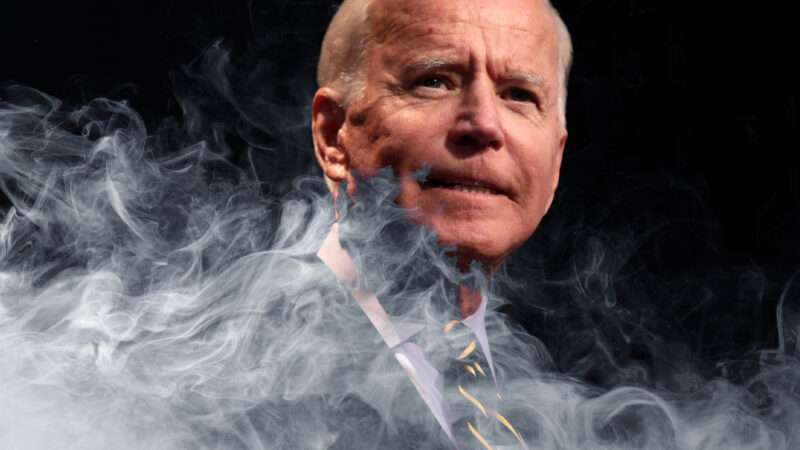
According to The New York Times, the "marijuana reform" that President Joe Biden announced in October represented "a fundamental change in America's response to a drug that has been at the center of a clash between culture and policing for more than a half-century." If only.
Biden issued a mass pardon for low-level marijuana offenders and ordered a review of the drug's regulatory status. Neither initiative affected the federal ban on marijuana, which he still supports.
The pardons apply to people convicted of simple marijuana possession under federal law or the District of Columbia Code. Biden said that step would help "thousands of people who were previously convicted of simple possession" and "who may be denied employment, housing or educational opportunities as a result."
As an act of clemency, the blanket pardon was massive. But in the context of the war on weed, which has generated nearly 30 million arrests since 1965, it looked less impressive. Rep. Dave Joyce (R–Ohio), co-chair of the Congressional Cannabis Caucus, noted that "more than 14 million cannabis-related records at the state and local level continue to preclude Americans from stable housing and gainful employment."
Because simple marijuana possession is rarely prosecuted at the federal level, the vast majority of such cases are beyond the president's clemency powers. But Biden's mercy notably did not extend to people convicted of manufacturing or distributing marijuana under federal law. As 16 drug policy reform groups noted in an open letter, his order "did nothing to address the thousands of federal cannabis prisoners currently incarcerated in federal prison." Nor did it help federal marijuana offenders who have been released from prison but continue to bear the lifelong burden of felony records.
The injustice of that situation is especially striking now that most states treat those federal felonies as legitimate business activities. Depending on the jurisdiction, the same conduct that can send someone to federal prison for years, decades, or even life can make someone else a rich and respected entrepreneur.
By himself, Biden does not have the authority to resolve the untenable conflict between state and federal marijuana laws. But despite his avowed transformation from an anti-drug zealot into a criminal justice reformer, he has stubbornly opposed efforts to repeal federal pot prohibition.
That position is contrary to the preferences expressed by more than two-thirds of Americans, including four-fifths of Democrats and half of Republicans. The most Biden is willing to offer them is his rhetorical support for decriminalizing cannabis consumption—a policy that was on the cutting edge of marijuana reform in the 1970s.
Biden's gesture toward reclassifying cannabis does not accomplish even that much. He said "it makes no sense" to treat marijuana as a Schedule I drug, a category supposedly reserved for drugs with a high potential for abuse and no accepted medical applications that cannot be used safely even under a doctor's supervision. Accordingly, he asked Secretary of Health and Human Services Xavier Becerra and Attorney General Merrick Garland to "initiate the process of reviewing how marijuana is scheduled under federal law."
Moving marijuana to a less restricted category would eliminate the research barriers that are unique to Schedule I. But by itself, it would not make marijuana available as a legal medicine, which would happen only if the Food and Drug Administration approved a specific product as safe and effective. Nor would reclassifying marijuana eliminate federal criminal penalties for growing, selling, and possessing it, which would require new legislation that Biden so far has declined to support.
The moral logic of Biden's distinction between simple possession and other marijuana offenses is hard to follow. As a Delaware senator in 1989, when he was keen to show that Democrats could be even tougher on drugs than Republicans, he declared that "we have to hold every drug user accountable, because if there were no drug users, there would be no appetite for drugs, and there would be no market for them." The root of the problem, according to Biden, was that Americans were defying the law by choosing to consume intoxicants that Congress had deemed intolerable.
Now Biden says it is plainly unjust to treat marijuana use as a crime. If so, how can it be just to arrest, prosecute, and imprison someone merely for helping people use marijuana? It's a question that Biden has not even attempted to answer.
The post Biden's 'Marijuana Reform' Leaves Prohibition Untouched appeared first on Reason.com.







